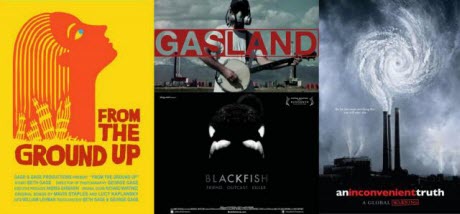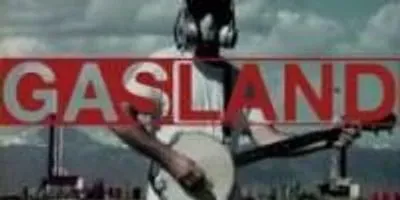 A University of Iowa sociologist and his co-researchers are the first to use the Internet and social media to systematically show how a documentary film shaped public perception and ultimately influenced public policy.Images courtesy of the University of Iowa Office of Strategic CommunicationSocial scientists have long argued documentary films are powerful tools for social change.
A University of Iowa sociologist and his co-researchers are the first to use the Internet and social media to systematically show how a documentary film shaped public perception and ultimately influenced public policy.Images courtesy of the University of Iowa Office of Strategic CommunicationSocial scientists have long argued documentary films are powerful tools for social change.
But a University of Iowa sociologist and his co-researchers are the first to use the Internet and social media to systematically show how a documentary film shaped public perception and ultimately led to municipal bans on hydraulic fracking.
By measuring an uptick in online searches as well as social media chatter and mass media coverage, Ion Bogdan Vasi, corresponding author of a new study, demonstrated how local screenings of Gasland—a 2010 American documentary that focused on communities affected by natural gas drilling—affected the public debate on hydraulic fracking. Additionally, Vasi and his collaborators demonstrated how local screenings were linked to an increase in anti-fracking mobilizations that, in turn, influenced the passage of local bans on fracking.
"There are few studies that describe the effect of documentaries on collective behaviors and social movement campaigns," says Vasi, an associate professor with a joint appointment in the Department of Sociology in the College of Liberal Arts and Sciences and the Department of Management and Organizations in the Tippie College of Business at the UI. "They used anecdotal evidence but not rigorous research."
The study, "'No Fracking Way!' Documentary Film, Discursive Opportunity and Local Opposition against Hydraulic Fracturing in the United States, 2010-2013," was published online Sept. 2 and will appear in the October print issue of the American Sociological Review.
According to the study, "screenings of Gasland in different locations had an effect upon the mobilization of local campaigns against the controversial practice of hydraulic fracturing; in turn, those local mobilizations made local policymakers significantly more likely to take action to ban the practice of fracking."
Vasi, who studies collective behaviors, says the documentary worked as a catalyst for policy changes in the Marcellus shale region (Pennsylvania, Ohio, New York, and West Virginia) where Gasland was filmed.
"The documentary clearly made an impact, but it was indirect," he says. "On average, more screenings led to more mobilizations, which led to policy changes."
Vasi says he chose Gasland for his study because it contains dramatic images similar to those of the burning Cuyahoga River that helped launch the environmental movement in 1969. In Gasland, viewers witness people set fire to tap water allegedly contaminated by fracking in Pennsylvania and other states. Another reason for his choice was that, at the time of the study, scientists didn't agree on the dangers of hydraulic fracking—a method of horizontal drilling into shale formations.
During his research, Vasi zeroed in on two time periods for his data collection: June 2010, when Gasland was released on HBO, and February 2011, when the documentary was nominated for an Academy Award.
"For the period of the study the number of Google searches for 'fracking' was much larger than for Gasland, with two exceptions: the months when the documentary was released on HBO and when it was nominated for an Oscar," Vasi says. "In fact, in June 2010 the number of searches for Gasland was four times higher than the number of searches for 'fracking,' indicating that the documentary created significant interest in the topic among the general public."
Researchers also found that chatter on Twitter about fracking increased over time, particularly after Gasland was released on HBO and again when it was nominated for an Oscar. The study shows "chatter increases by approximately 6 percent after the release and by approximately 9 percent after the nomination compared to the previous month."
Finally, mass media coverage of fracking—as measured by newspaper articles—increases over time, particularly after Gasland's release and award nomination. According to the study, "more than half of the articles that mention fracking in June 2010 and January 2011 also mention Gasland."
However, Vasi says negative public sentiment about hydraulic fracking was most readily apparent in online activity and social media chatter because traditional newspapers are obligated to show both sides of an issue.
He also said that fracking serves as an excellent example of how community activists grapple with contentious energy issues and the environment, particularly because of recent legislation that makes local fracking bans illegal in states such as Texas.
Authors of the study hope future studies will investigate the effects of other documentary films and see why some films lead to large-scale mobilizations and others do not.














